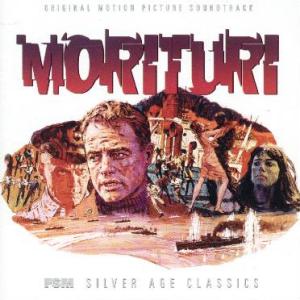Jerry GOLDSMITH
Morituri
David SHIRE
Raid on Entebbe
OSTs
FILM SCORE MONTHLY Vol 4 No. 12 [57:50]
Available from the magazine Film Score Monthly 8503 Washington Boulevard, Culver City, CA 90232 USA; toll free: 1-888-345-6335 overseas: 310-243-9595; fax: 310-253-9588; email: info@filmscoremonthly.com.

Hard on the heels of the release of Jerry Goldsmith's "Rio Lobo" score by Prometheus comes this latest issue by Film Score Monthly. Unlike the languid lyricism of "Rio Lobo," "Morituri" is more knuckle-and-grit --- a taut, dramatic work that relies on percussive, occasionally exotic instrumentation to support a story of high-seas espionage including Nazis and a turncoat spy (Marlon Brando). There are echoes here of Goldsmith's approach to television-series scoring (which he was still actively involved in at this time: 1965) as well as foreshadowings of film scores to come, including "The Sand Pebbles." Goldsmith opens "Morituri" with a solo zither theme, putting the listener immediately in mind of "The Third Man" --- perhaps intentionally, as in each film the instrument suggests not only a foreign locale, but also a sense of the main characters' psychological isolation. Goldsmith utilizes the zither sparingly but effectively in various cues, occasionally using it in counterpoint with other solo instruments, including a harpsichord in the cues 'What to Do Next' and 'Nine Days Out.' His main (and only) theme suggests a bleakness and tension that fittingly matches "Morituri's" grim tale. Like the zither, this theme is used sparingly. What stand as the hallmark of this early-vintage Goldsmith score are its action and suspense cues, the latter including a ticking-clock device in 'Hot Wire' and a pulsing effect, achieved by combining a Novachord organ and an electric guitar in the 'Traffic Jam' cue. Excellent, ostinato-based action music is heard in the cues 'Caught in the Act' and 'Boat Drill.' A dirge heard in the cue 'The Prisoners' may put Goldsmith fans in mind of "The Blue Max," which he scored just a year later.
Indeed, Goldsmith fans will find "Morituri" most interesting as a sampling of his early scoring techniques rather than as a listening experience in itself, solid work though it is. Film Score Monthly's Lukas Kendall, Jeff Bond and Co. have done their usual, commendable job -- both in resurrecting the various score elements from the vaults of 20th Century Fox, and providing analytical insight to the music's function within the film.
Fittingly matched with "Morituri" is David Shire's spare score for the 1976 telemovie "Raid on Entebbe," one of several quickly made features capitalizing on the incredibly daring (and successful) Israeli commando rescue of a planeload of hostages from under the nose of Ugandan dictator Idi Amin. Given a short window in which to work, Shire makes good use of a traditional Israeli folk tune, "Shevet Ac'heem" and adds a theme he composed (while driving in his car!) for the commandos. Working with Kendall, Shire has assembled his score into a four-movement, 15-minute suite - 'The Hijacking,' 'The Imprisonment,' 'The Raid,' and 'The Return.' The first of these contains little of interest, but the second cue offers a haunting solo viola theme as the spectre of the Holocaust begins to loom over the passengers. In 'The Raid,' Shire's piano-percussive commando theme takes over, propelling the drama to its fantastic (and, amazingly, completely true) conclusion. 'The Return' opens with a short elegy in brass for the slain commando Yoni (Charles Bronson) followed by a choral performance of the folk tune under which Shire presents a quick reprise of his commando theme.
John Huether
Morituri
/ Raid on Entebbe

Mark Hockley adds:-
A very welcome release of Jerry Goldsmith’s admirable score from the mid 1960s, a strong example of the now familiar but always distinctive, evocative style he developed during that period. Also known as Saboteur: Code Name Morituri, this World War II suspense drama starred Marlon Brando and Yul Brynner and the composer quickly establishes an off-kilter, uneasy atmosphere with ‘Main Title/Tokyo’, where a solo zither (made famous by Anton Karas on The Third Man (1949)) leads a plaintive, slightly ambiguous melody. This theme reappears in various forms, most notably as a melancholic waltz on ‘Theme From Morituri’ and in far more robust fashion on ‘A Change of Fate/Sneak Attack’. Much of the score though is given over to suspenseful, portentous pieces like ‘Assignment in Macao’ and ‘Traffic Jam/Caught in the Act’, where echoing electronics invoke an almost otherworldly ambience, the latter building fervently toward a thrilling finale with a few decidedly Herrmannesque touches thrown in for good measure! And this kind of strident action/suspense music can also be heard on other praiseworthy cues such as ‘Boat Drill’, a typically compulsive rhythmic piece in the composer’s best manner. But this is a score that has strength in depth and many tracks make a strong impression; ‘Nine Days Out’ with menacing brass playing under the main theme, the dirge-like ‘The Prisoners’, with some very nice string work towards the end and the wild ‘A Lost Cause’, where electric bass pounds away to create a high level of excitement.
In many ways this is an archetypal Goldsmith score, bold, imaginative, often dissonant and yet always melodic. A very valuable record of a sterling composition by one of the truly great film composers of all time.
As a bonus there is also a very worthwhile short suite of cues from David Shire’s score to Raid on Entebbe (1977), a retelling of the dramatic true-life hijacking of a commercial aircraft and the subsequent rescue of a group of Israeli hostages. Indeed, the music is most notable for the way Shire has integrated Jewish folk music into his action cues, as heard on the driving, percussive ‘The Raid’, while ‘The Return’ incorporates the traditional Israeli folk song ‘Shevet Ac’heem’ in a rousing finale that has real emotional impact. Good value.
Mark Hockley

Return to Index
